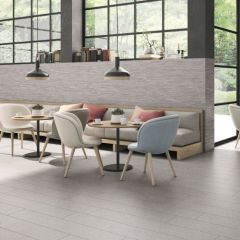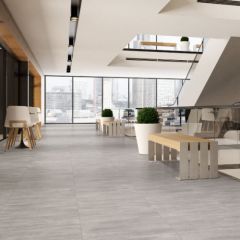Porcelain Tiles
- Price $50.00 and above Remove This Item
- Applications Commercial Remove This Item
Porcelain Tiles Los Angeles
Porcelain Tile is generally made by the dust pressed method from porcelain clays which result in a tile that is dense, impervious, fine grained and smooth, with a sharply formed face. Porcelain tiles usually have a much lower water absorption rate (less than 0.5%) than non-porcelain tiles making them frost resistant or frost-proof.
Glazed Porcelain Tiles are coated with a liquid glass, which is then baked into the surface of the clay. The glaze provides an unlimited array of colors and designs as well as protects the tile from staining. These tiles are much harder and more wear and damage resistant than non-porcelain ceramic tiles, making them suitable for any application from light traffic to the heaviest residential and light commercial traffic. A glazed tile is already stain proof, so there is no purpose to putting on a sealer.
Unglazed Porcelain Tiles are pretty much the same as the glazed tiles, except that their surface is not coated.
Full body Porcelain Ttiles carry the color and pattern through the entire thickness of the tile making them virtually impervious to wear and are suitable for any application from residential to the highest traffic commercial or industrial applications.
Porcelain Tiles are available in matte, unglazed or a high polished finish.
What is the difference between Through Body Porcelain Tile and Glazed Porcelain Tile?
The term through body tile or full body tile, refers to the tile being consistent in composition through out the body of the tile. The colour and texture runs through the entire dimensional thickness of the tile. Full bodied porcelain is less permeable to water; its body is less than 0.5% absorbent to water so it counts as true porcelain.
Glazed Porcelain Tile Characteristics and Benefits
Glazed tiles have a glass wear layer or hard finish usually coloured, then applied to the surface of machine made clay tiles. The term glaze can also refer to the material or mixture from which the coating is made.
Advantages of glazed porcelain:
• Strong and dense tile
• Chemicial resistant
• Frost resistant
• Non-porous; the glaze is an impervious finish that protects the tile from stains and moisture.
• Available in a large selection of colour and sizes.
Glazed tiles are best suited in residential, up to light commercial settings. Manufacturers measure and rate the wearability of glazed tiles with what is called a PEI (Porcelain Enamel Institute) rating.
PEI 1 Tiles suitable only as Wall tiles.
PEI 2 Tiles suited for general Residential areas where they will be walked on by soft sole, with only small amounts of scratching dirt.
PEI 3 Tiles suited for all Residential areas.
PEI 4 Tiles suited for all Residential areas and some light Commercial areas.
PEI 5 Tiles are suite for all Residential areas and light to medium Commercial areas.
Through Body PorcelainTile Characteristics and Benefits
• Strong and dense tile that can withstand high surface traffic, typically PEI 5.
• Chemical resistant.
• Does not have a glaze that may wear off or scratch and even if there are scratches they will not be noticed as the colour runs entirely through the body of the tile.
• The colour of tile runs all the way through the tile.
• When produced with an anti slip finish, they can be installed in wet areas and areas where slip resistant floors are required.
• Frost resistant.
• Water absorption is less than 0.5%.
• Available in a large range of colours, sizes and textures.
• Can be produced to look like Stone, Granite, Marble, Terracotta, Wood, Concrete and Metal


